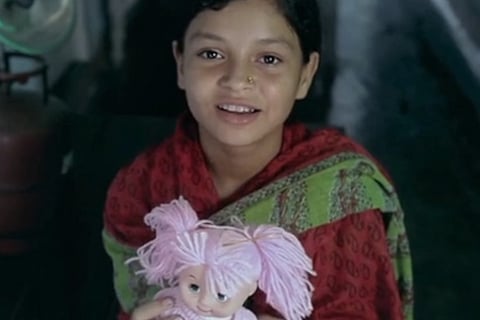

When Maida is asked how she goes to school, she answers cheerfully, "wearing my clothes". Three years later when she is asked the same question, the smile is not there, but she still answers, "wearing my clothes and combing my hair".
Lubna Yusuf, fresh out of law school, decided to make a film on Maida’s story, tracing her life through eight years - but she wanted a success story. A girl from a village in Bihar, reaching heights. But Maida dropped out after class 7 and got married, like other girls of her village. Lubna finished her documentary which she named after her, with Maida’s little daughter on her lap. A girl that Lubna worries may grow up and have the same fate as her mother, unless the system changes.
At the Sree Theatre in Thiruvananthapuram where Maida is screened for the International Documentary and Short Film Festival of Kerala, Lubna answers a bearded man’s question - did she try reporting the incident to the authorities? Lubna did, but by then, Maida’s wedding was over and she was a mother too. Nothing could be done, she says.
“I feel bad about what happened. I wanted to make a film based on the impact of the children being given free food and cycles at school. I thought I will trace a girl's story and when she finished school, I could help her when she pursues further education, or get her a job. Maida was doing so well in school,” Lubna tells TNM in an interview.
Lubna Yusuf
At first when she went to shoot, Maida was a little girl – about eight years of age, happily answering her questions, singing freely. Her family too had been receptive of the shooting. People in the village were curious and wanted to see the filming. But when Lubna began coming back every year to shoot Maida’s story, they got a little suspicious. She was asking questions too. Lubna had to abandon her crew and shoot the film herself. You see Maida turning quieter when Lubna visits her three years later. “The story took a different turn every year. By the third year there was a huge difference. She didn’t want to talk. She seemed subdued and was no longer encouraged to study. She learnt to have no ambition. What is most devastating is that a child is not even aware of her own rights – to speak for yourself, you should know you have those rights!” Lubna says.
She doesn’t believe it is because there are no laws. There are. There are also NGOs helping out and funds pouring in. “But the mental setup should change. Parents are scared of sending girls to school post puberty. The girls will drop out once they begin menstruating. Maida did. That’s why she didn’t go to school after class 7.”
The year before Maida’s wedding, Lubna was not allowed to meet her. She didn’t know Maida was going to get married. And then nine months later, Maida became a mother. “It is a whole loop. Changing the law is not going to change the loop. Instead of food and cycle, maybe steps should be taken to make the parents more aware. They should be encouraged to send their girls to school and reassured that they will be safe there. That no one would attack the girls, and they will have bathrooms to use when they menstruate.”
The last shot of Maida in the movie is of her in a veil. “She is happy, she is sorted out, falling into the system. I am afraid for the daughter she holds on her lap. Will that child too follow in Maida’s footsteps?” Lubna asks.